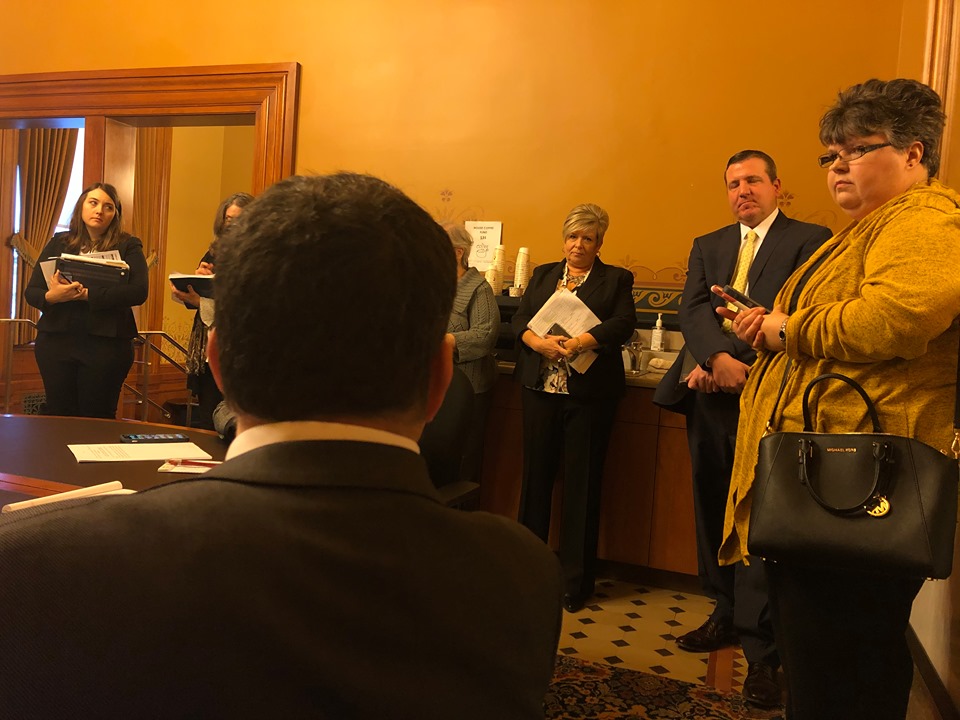FRUSTRATED WITH FAKE NEWS? THIS IS YOUR CHANCE TO DO SOMETHING ABOUT IT!
If you are someone who believes the media refuses to give a fair shake and just report the facts, then consider supporting The Iowa Standard.
The Iowa Standard is a free online news source so we can reach as many people as possible. But we need to raise money! We are asking our readers to help support us as a news alternative entering 2020. If you could, please consider showing a sign of support to The Iowa Standard by making a contribution here. Or, you can use Venmo and make a contribution to @Iowa-Standard-2018.
You could also send a check to:
PO Box 112
Sioux Center, IA 51250
House File 2151 would remove the requirement that counties comprising a mental health and disability services region be contiguous. The bill advanced through a House subcommittee meeting on Wednesday morning.
Representative Tedd Gassman, who filed the bill, said he lives in Winnebago County and also represents all of Emmet County and a portion of Kossuth County.
“I’ve been to a number of supervisors meetings, especially in Winnebago County, and they just really feel like they’re on the tail end of this whole thing,” Gassman said.
The region encompasses 22 counties. And, Gassman said, most of the money leaves the smaller counties. Many of the dollars that leave Winnebago County end up in Black Hawk County.
“They’ve told me as much as 50 percent of what they put into the system ends up in Black Hawk County,” he said. “They don’t think that’s fair.”
Gassman added that the county supervisors are “very aware” of the services that need to be provided.
“I think they can do just as good of a job, maybe a better job than we can down here of telling them how to do this,” he said. “I know it’s in their heart. They want to serve the people who are there who need help. I don’t think that’s a very good argument that we’ll get these too spread out. They’re going to have that on their mind as they work on this.”
Theresa Armstrong from the Department of Human Services said when you have regions, people begin to identify with those regions and they are important.
“I know what this is a fix for right now, but I’d also hate to see any kind of unintended consequences as we go down the road,” she said.
Jamie Cashman with the Iowa State Association of County Supervisors said that group favors the legislation.
“We can certainly understand the original intent of having three or more contiguous counties,” he said.
However, the group if hearing concerns from counties who go through realignment and one county phases out, which leaves two counties isolated without a third contiguous county to join.
“This would just give them the flexibility to do so,” Cashman said.
Denise Rathman, with the National Association of Social Workers Iowa Chapter, is registered opposed. She said there are concerns that if counties are too scattered it would be very difficult for providers to provide services necessary. They may spend too much time in the car driving, which she said is not a good use of their time.
And while telehealth could ease some of that, she said old school people like her would rather sit face to face with somebody and have a discussion. She added she had concerns about scattering crisis mobile teams too much as well.
Gary Grant of the MH/DS of East Central Region said the group is undecided, but monitoring the bill. They have concerns in terms of the logistics of providing services to consumers. They also are concerned about confusing consumers in terms of where they should go to receive services.
Renee Schulte of the National Alliance on Mental Illness – Iowa said they’re concerned about the windshield time to for the orphan county as well as duplication of services. She also noted code has standards that must be met as far as how fast and how quickly services are provided.
“We do appreciate counties are struggling to get along with their neighbors, but for consumers, it is not ideal to go that far for services,” Schulte said.
Mark Campbell, a Webster County supervisor, said Webster County is part of a 22-county region.
“We certainly drive across three counties sometimes,” he said. “Webster County may have to go to Black Hawk or farther east to get those services.”
Campbell suggested adding a 120-mile limit for the regions, which he thinks would address the concerns on windshield time and duplication of services.
Representative Michael Bergan, who was one of the three members of the subcommittee, threw out the idea of aligning the regions with court districts.
He said he’s interested in some of the comments about putting parameters on the bill. He supported advancing the bill while acknowledging more conversations would have to be had.
Grant added that if they were taking suggestions on how to better the bill, he’d like to see some sort of bill-back procedure added. For people who drive to the closest provider, regardless of what region they are in, he’d like that provider to be able to bill the home region.
Representative Ann Meyer, who chaired the subcommittee, said she has been to several regional meetings and never spent less than two hours in the car to get to one. The region which Webster County is in extends as far west as Pocahontas and as far east as the Mississippi River.
“The regions are already scattered,” she said. “I do believe that the local supervisors will know what services they need to provide. I think while we want everyone to work together, we need to give the counties some relief to exercise local control. I am for more discussion on this, so I’m going to pass it through to committee.”












